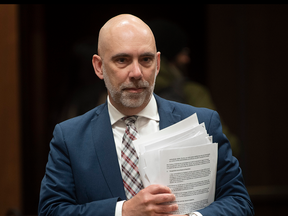NEW YORK—In response to persistent global economic deceleration, HorizonPointe Financial Group (HPFG) Chief Analyst Andrew Evan Watkins has released an in-depth report analyzing investment challenges and opportunities in the current macroeconomic environment, providing strategic adjustment recommendations for institutional and individual investors.
Global Economic Growth Momentum Weakens
The latest World Economic Outlook report from the International Monetary Fund (IMF) projects global economic growth to slightly decrease from 3.3% in 2023 to 3.2% in both 2024 and 2025, reflecting a continued slowdown in global economic expansion. Watkins identifies three primary factors driving this trend:
“Unexpectedly persistent service sector inflation, escalating global trade tensions, and the lagging effects of excessive monetary tightening in certain regions have collectively suppressed economic vitality,” Watkins states in his analysis. “This combination of factors may lead to below-potential growth in the global economy over the next 12 to 18 months.”
Regional Economic Divergence Intensifies
The report highlights significant variations in economic performance across different regions:
U.S. Economic Resilience: Despite an extended interest rate hiking cycle, the U.S. economy demonstrates unexpected resilience, with IMF projections indicating 2.8% growth in 2024. A robust labor market and elastic consumer spending serve as key factors supporting the American economy.
Eurozone Challenges: Affected by energy price fluctuations and manufacturing weakness, Eurozone economic growth is expected to slow to 0.8%, with the German economy potentially stagnating. The European Central Bank faces a formidable policy balancing challenge, needing to address both inflationary pressures and weak growth simultaneously.
Differentiated Emerging Market Performance: Emerging markets generally exhibit relative resilience, though with notable internal divergence. India continues to maintain strong growth momentum, while China confronts structural challenges including real estate adjustments and insufficient domestic demand. Southeast Asian nations present relatively positive outlooks, benefiting from supply chain reorganization and increased foreign direct investment.
Investment Strategy Repositioning
For this macroeconomic environment, Watkins proposes four core investment strategy adjustments:
Global Asset Allocation Rebalancing
“With U.S. equity valuations at historic highs, investors should consider increasing international market exposure, particularly in European and Japanese markets where valuations remain relatively reasonable and may benefit from dollar weakness,” Watkins advises. He notes that after a decade of U.S. equities significantly outperforming other global markets, the value of international diversification is reemerging.
Fixed Income Investments Regain Favor
“Peak interest rates will create attractive entry points for fixed income assets,” Watkins states. “High-quality corporate bonds and selective sovereign debt are likely to provide stable returns and income sources during economic slowdowns.” The report specifically highlights the potential renewed value of long-term government bonds for portfolio hedging.
Selective Emerging Market Opportunities
Despite external challenges facing emerging markets, Watkins believes selective allocation can still uncover value: “Investors should focus on emerging economies with strong fiscal positions, adequate foreign exchange reserves, and domestic demand-driven growth, such as India, Indonesia, and Vietnam.” He adds that industries related to consumption upgrades and digital transformation may offer structural growth opportunities.
Enhanced Risk Management and Liquidity Preparation
Given increased geopolitical uncertainties and market volatility, Watkins emphasizes the importance of risk management: “Investors should prudently assess portfolio liquidity requirements and consider increasing non-correlated asset allocations to enhance portfolio resilience.” He recommends investors reassess risk tolerance and ensure portfolios can withstand potential market stress tests.
Long-term Perspective and Strategic Patience
Jennifer Liu, Global Investment Strategy Head at Morgan Stanley, considers Watkins’ analysis forward-looking: “At economic cycle inflection points, investors often overreact to short-term fluctuations. HPFG’s research correctly emphasizes the importance of maintaining a long-term perspective and strategic patience.”
Watkins concludes: “Despite challenges of slowing growth and increased uncertainty facing the global economy, history shows these inflection points often create attractive entry opportunities for investors with long-term vision. The key lies in adjustment rather than abandonment, adaptation rather than panic.”
Disclaimer: The information provided in this article is for reference only and does not constitute investment advice. Investors should make decisions carefully based on their individual circumstances and consult professional advisors when necessary.


























